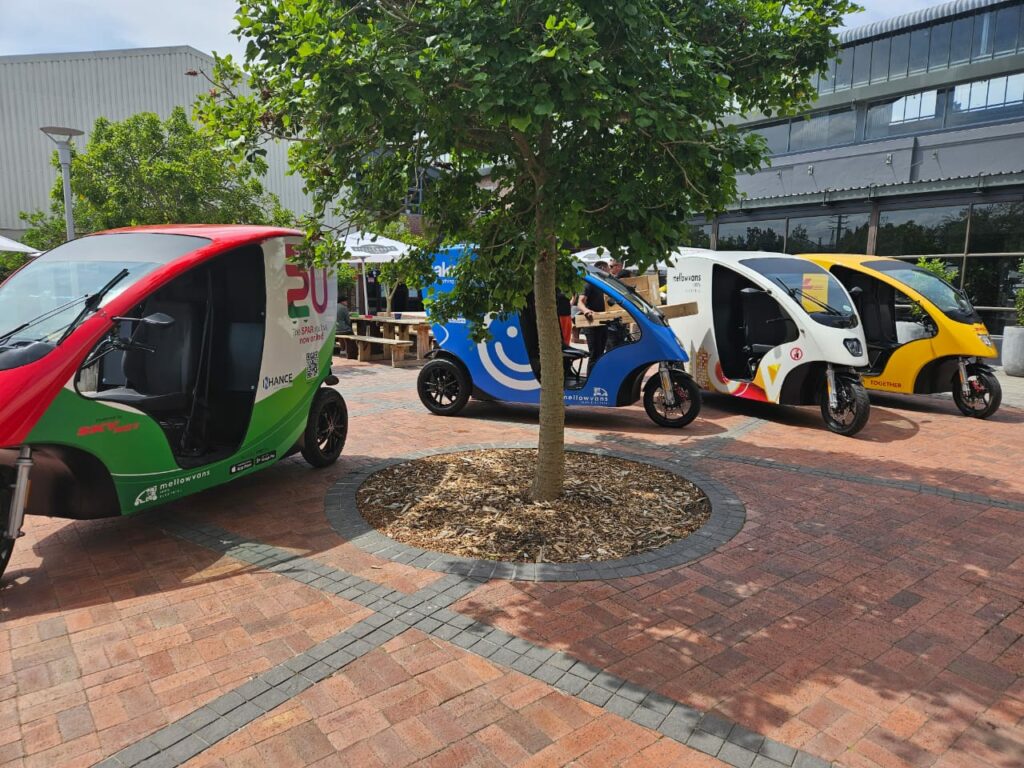NEIL DU PREEZ left his job overseas to return home to South Africa and offer low-maintenance urban mobility solutions now transforming the country’s transportation landscape.
In East Africa, the use of electric motorcycles has gained momentum and they are ubiqui- tous like never before.
Comparatively, the adoption of electric vehicles (EVs) has been slow in South Africa. While popular brands like Volvo and Toyota have seen some uptake, the transportation and delivery sectors are lagging behind in the transition to electric options.
Setting the stage to fast-track this shift is Stellenbosch- based Neil du Preez. With a background in commodities trading and chemistry, his journey started in 2012 when he gave up his overseas job to return to South Africa and manufacture light EVs to change the course of the trans- port sector.
“I wanted to create a sustainable, cost-effective urban mobility solution tailored for last-mile deliveries,” du Preez tells FORBES AFRICA.
Loading...
“The goal was to offer an efficient alternative to motorcycles and traditional delivery vans. Initially, we designed passenger vehicles… called MellowCabs.”

South Africa’s population is heavily reliant on public transport and the country boasts a thriving minibus-taxi industry. Statista estimates that taxis contribute around R40 billion ($2.16 billion) to the gross domestic product (GDP) annually. The industry reportedly transports approximately 15 million people daily.
Du Preez was at the right place at the right time.
In 2019, logistics company DHL wanted to use his MellowCabs for deliveries but only if they were converted into delivery vans. Du Preez saw more potential in parcel deliveries and cargo transport, so seized the opportunity, and pivoted to MellowVans.
He says the company became the first South African automotive Original Equipment Manufacturer (OEM) to achieve European and British homologation. Last year, the EV company partnered with Ite-mate Solutions to launch a new mobile store solution to serve African telecommunications firms. Du Preez says the low-maintenance vehicles are developed specifically for Africa’s tough landscape.
“[The MellowVans] have become a common sight in South Af- rica’s urban centers where brands take advantage of their low operating cost, easy maintenance, and extensive technology and data to enhance their last-mile delivery,” he adds.
Du Preez is proud of the partnerships with corporates like e- commerce company Takealot, and retail giant Spar. The company has now expanded to other African countries, launched in Europe, and set up a new production facility in South Africa.
“We’re also finalizing plans for an assembly hub in Europe,” he says. His vehicles offer the lowest cost per kilometer of any last-mile solution, he adds. “Our vehicles have a range of 130km per charge, which at current Eskom (South Africa’s national electricity provider) rates, translates to 15c-per-km cost. In addition, our technology platform provides real-time insights into vehicle performance, driver behavior, and other metrics, allowing operators greater control and visibility over their fleet.”
However, this has not come without its challenges, especially as South Africa’s adoption of EVs still shows that there is room for improvement.
Du Preez opines that acceleration of the sector has been hin- dered by the absence of comprehensive regulations and incentives for electric two-wheelers.
“Governments can offer incentives and charging infrastructure, while private players can innovate on financing models and fleet adoption,” du Preez suggests.
However, there are encouraging signs. In February 2024, South Africa’s Finance Minister Enoch Godongwana highlighted the government’s commitment by announcing a 150% tax deduction on qualifying EV and hydrogen vehicle production investments.
“To encourage production of EVs in South Africa, the govern- ment will introduce an investment allowance for new investments, beginning 1 March 2026,” Godongwana said. According to reports, this legislation is expected to unlock approximately $27 billion in new investments within the country’s EV sector.
It means entrepreneurs like du Preez are on the right track to growth. As the founder and CEO of MellowVans, some sound strategizing over the years has also earned him multiple accolades and prestigious national and international awards.
“[My leadership strategies] that have helped scale MellowVans has been agility, strong partnerships, and a focus on solving real customer pain points rather than just pushing technology.” As the EV industry continues on its path to progress, and more entrepreneurs find themselves in the space, the advice that du Preez offers is simple: “Start lean, focus on solving specific problems, and build strong local partnerships to navigate regulatory and market challenges.”
Loading...
